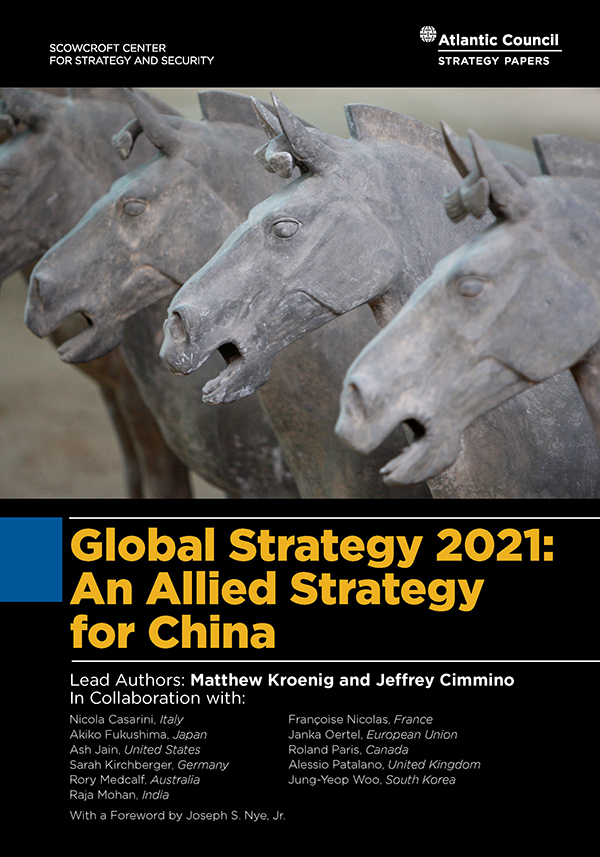Atlantic Council Strategy Paper
In a paper titled “Global Strategy 2021: An Allied Strategy for China”, the authors – Matthew Kroenig and Jeffrey Cimmino along with expert collaborators from ten of the world’s leading democracies – writing for the Atlantic Council, propose a logical and actionable strategy for addressing the China challenge. The strategy articulates clear longand short-term goals and several major strategic elements to help achieve those goals.
First, the paper calls for strengthening likeminded allies and partners and the rules-based system for a new era of great-power competition. This will require, for example, prioritizing innovation, repairing infrastructure, and establishing new institutions to bolster democratic cooperation. A successful strategy begins at home.
Second, likeminded allies and partners should defend against Chinese behavior that threatens to undermine core principles of the rules-based system. Executing this element will mean prohibiting China’s engagement in economic sectors vital to national security, countering Chinese influence operations, and deterring and, if necessary, defending against, Chinese military aggression in the Indo-Pacific.
Third, the authors recognize that China also presents an opportunity, and they recommend that likeminded allies and partners engage China from a position of strength to cooperate on shared interests and, ultimately, incorporate China into a revitalized and adapted rules-based system. Thus, efforts should be made to cooperate with China on issues of shared interests, including public health, the global economy, nonproliferation, and the global environment.
They argue that the desired endpoint of the strategy is not everlasting competition or the overthrow of the Chinese Communist Party, but rather to convince Chinese leaders that their interests are better served by cooperating within, rather than challenging, a rules-based international system. They pay attention to both the rivalry and the cooperative possibilities in the relationship.
The paper presents a sound strategic framework and a comprehensive and practical plan for the US and its democratic allies to follow as they address the China challenge. I encourage experts and officials from the United States and allied nations to study this thoughtful report. Following this strategy could help leading democracies cope with the China challenge and advance a revitalized rules-based system for years to come.
Here is an executive summary.
Over the past seventy-five years, likeminded allies and partners have constructed a rules-based international system that has generated unprecedented levels of peace, prosperity, and freedom. The system, however, is coming under increasing strain, especially from the reemergence of great-power competition with China. The increasing assertiveness of the Chinese Communist Party (CCP) poses a significant challenge to the interests and values of likeminded allies and partners and the rules-based system.
THE CHINA CHALLENGE IS EVIDENT IN THE ECONOMIC, DIPLOMATIC, GOVERNANCE, SECURITY, AND HEALTH DOMAINS.
• Economic: China engages in unfair economic practices that violate international standards, including: intellectual-property theft, subsidizing state-owned companies to pursue geopolitical goals, and restricting market access to foreign firms. It is also investing enormous state resources in a bid to dominate key technologies of the twenty-first century.
• Diplomatic: Through ambitious plans, such as the Belt and Road Initiative, China is expanding its diplomatic influence in every region and taking aggressive action against countries that resist or criticize Beijing. Its coercive diplomacy, however, is beginning to provoke a backlash.
• Governance: China’s economic and political model of authoritarian state capitalism is the first formidable alternative to the successful model of open market democracy since the end of the Cold War. Current and would-be autocrats look to China as a model for combining authoritarian control with economic success. Abroad, China is using “sharp-power” tools to disrupt democratic practices and is exporting surveillance technologies that bolster authoritarian governments.
• Security: China continues its decades-long military modernization and expansion, while making sweeping territorial claims and increasing its military and intelligence activities globally. Its growing capabilities increasingly threaten the United States’ collective defense with long-standing allies in the Indo-Pacific and beyond.
• Health: In a failed bid to protect its image, the CCP suppressed information about the novel coronavirus, silenced those attempting to speak out about it, and used its influence in the World Health Organization (WHO) to hamper global efforts to understand, and quickly mitigate, the spread of the virus.
The CCP poses a clear challenge to the rules-based international system, but there are domains in which China and other leading nations share interests and could develop a more cooperative relationship, including on the global economy, arms control, nonproliferation, the environment, and development aid.
This Atlantic Council Strategy Paper proposes a comprehensive strategy for how likeminded allies and partners should address the challenges and opportunities presented by China.
By likeminded allies and partners, the authors mean several categories of leading states. The active participation of powerful democracies is of critical importance, including the nations of the D-10 (the United States, Japan, Germany, the United Kingdom, France, Italy, Canada, South Korea, and Australia, plus the European Union), and other NATO allies. Other formal and informal partners (such as India, Sweden, Finland, Brazil, Indonesia, the Philippines, Vietnam, Singapore, the United Arab Emirates, and others) will also be helpful in executing various elements of this strategy.
THIS STRATEGY OUTLINES THE FOLLOWING OVERARCHING SHORT- AND LONG-TERM GOALS.
• Long-Term: Likeminded allies and partners would prefer a stable relationship with China that avoids permanent confrontation and enables cooperation on issues of mutual interest and concern. They would like China to become a responsible member of a revised and adapted rules-based system that respects individual rights and China’s legitimate interests. The problem is that such a relationship will be difficult to achieve under President Xi Jinping and the current generation of CCP leadership, who have launched China on a more confrontational path.
• Short-Term: In the meantime, therefore, likeminded allies and partners must prevent China from continuing to threaten their interests in the economic, diplomatic, governance, security, and public health domains. This strategy seeks to prevent, deter, defend against, and impose costs on Chinese actions that violate widely-held international rules and norms. The strategy seeks to shape Chinese behavior in a positive direction by demonstrating to Beijing that challenging likeminded allies and partners is too difficult and costly. At the same time, likeminded allies and partners should maintain open lines of communication, find areas of mutual cooperation, and work to convince Chinese leadership that Beijing’s interests are better served by playing within, rather than challenging, a revitalized and adapted rules-based system.
The strategy is premised on a two-track approach of:
1) seeking deeper cooperation with allies, partners, and likeminded states to develop a coordinated strategy for defending against and engaging with China; and
2) engaging with China on issues where collaboration is possible, and with an eye toward constructing a revitalized and adapted rules-based system.
THE STRATEGY CONSISTS OF THREE MAJOR ELEMENTS.
1) Strengthen: Likeminded allies and partners should strengthen themselves and the rules-based system for a new era of great-power competition. They should
• Facilitate a recovery from the current health crisis and pandemic-induced economic downturn;
• Prioritize innovation and emerging technology by boosting research and development spending, investing in STEM (science, technology, engineering, and math) education, and securing supply chains;
• Invest in repairing and renewing infrastructure and ensuring it incorporates advanced technology, including fifth-generation (5G) wireless capability;
• Reassert influence in existing multilateral institutions by, for example, promoting candidates for leadership positions that favor upholding open and transparent global governance;
• Create new institutions to facilitate collaboration among likeminded allies and partners in Europe, the Indo-Pacific, and globally; and
• Develop new military capabilities and operational concepts to achieve a credible combat posture in the Indo-Pacific region.
2) Defend: Likeminded allies and partners should defend against destabilizing Chinese behavior and impose costs on Beijing’s ongoing violations of core principles of the rules-based system. They should
• Prohibit Chinese engagement in economic sectors vital to national security;
• Collectively impose offsetting measures, including tariffs, for industries negatively affected by China’s unfair practices;
• Collectively resist Chinese economic coercion by reducing economic dependence on China and offering offsetting economic opportunities to vulnerable allies and partners;
• Counter Chinese influence operations and defend democracy and good governance;
• Coordinate penalties on China when it uses coercive tools, such as arbitrary detention of foreign nationals, to pressure their home countries;
• Spotlight CCP corruption and human-rights violations and encourage human-rights reforms in China; and
• Maintain a favorable balance of power over China in the Indo-Pacific to deter and, if necessary, defend against Chinese aggression.
3) Engage: Likeminded allies and partners should engage China from a position of strength to cooperate on shared interests. They should
• Maintain open lines of communication with China, even if competition intensifies;
• Seek to cooperate with China on issues of mutual interest, including public health, the global economy, nonproliferation, and the environment, without compromising core values; and
• Engage with China to, over the long term, incorporate China into a revitalized and adapted rules-based system.
The three parts of this strategy are interconnected. Likeminded allies and partners will need to strengthen themselves—both domestically and their relationships—to be prepared for a new period of great-power competition. This, in turn, will put them in a better position to defend against China’s threatening behavior. By demonstrating collective resolve and a willingness to impose costs on Beijing, likeminded allies and partners will be able to constructively engage China, and help convince Beijing that its current approach is futile and that its interests are better served by cooperating with, or acquiescing to, a rules-based system, rather than challenging it.
Likeminded allies and partners came together many times in the twentieth century to defeat autocratic revisionist challengers. Working together, they can once again advance their interests and values, and the broader rules-based system, and fend off the twenty-first-century challenge posed by the Chinese Communist Party.
In several previous cases, former rivals became close allies. If successful, this strategy will ultimately help bring about a cooperative future, in which China is not an adversary, but an integral member of a strong and sustainable rules-based international system.


















